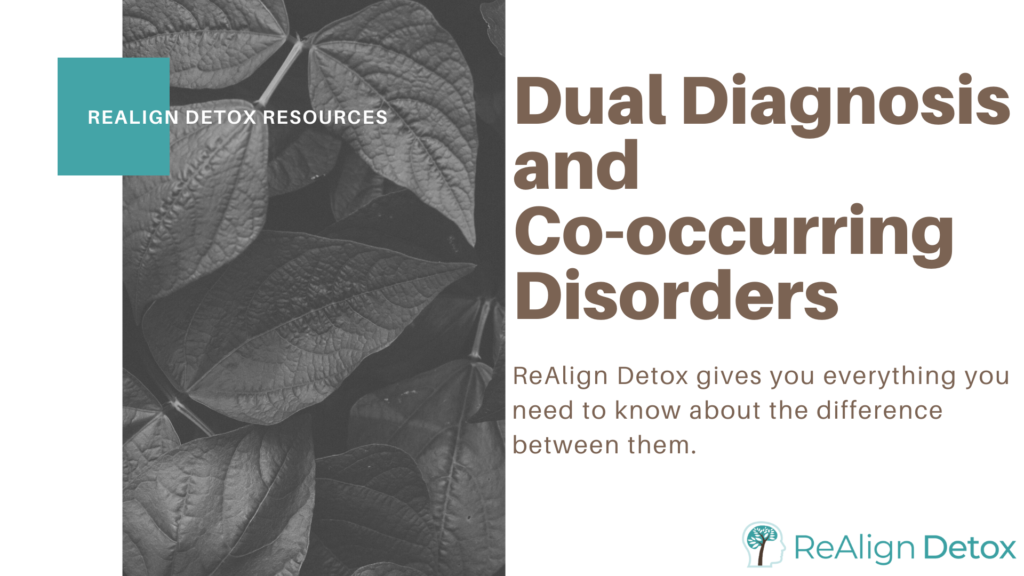
Psychiatric disorders and substance abuse are closely connected. There is a high rate of patients diagnosed with substance use disorders who also have mental illnesses. Dual diagnosis and co-occurring disorders are terms sometimes used interchangeably to describe being diagnosed with more than one disorder simultaneously. How do they differ?
There is no real difference between dual diagnosis and co-occurring disorders — although co-occurring is preferred when discussing the presence of both mental and substance use disorders simultaneously.
Substance use disorders do not necessarily result from mental illness. The reverse is also true. A person who has a mental illness or substance use disorder is at a much higher risk of having a similar condition compared to the general population.
Drug abuse may be the cause of all of these things, but they are distinct diagnoses. Dual diagnoses are possible.

A few disorders frequently accompany addiction. It is these disorders that are usually at the root of an obsession. When it comes to long-term addiction recovery, it’s critical not to ignore a person’s mental health condition or behavioral disorder.
People with ADHD have a higher risk of abusing substances as a way to manage their symptoms. It is common to prescribe stimulants for ADHD, becoming habit-forming and leading to a problematic substance abuse pattern.
Bipolar disorder is associated with addiction in approximately half of the cases. Any disease can lead to a temptation to self-medicate. Patients with bipolar disorder use drugs and alcohol for temporary relief from emotions.
The co-occurrence of addiction and borderline personality disorder (BPD) has been studied. At some point in their lives, nearly two-thirds of people with BPD abuse substances.
The United States has an estimated one in ten adults suffering from depression. Drugs and alcohol are often used by people diagnosed with depression to self-medicate. The problem is usually made worse as a result. The crash after the high can be devastating for those with a pre-existing depressive condition.

A feeling of inferiority is often at the root of eating disorders. Among people with these disorders, appetite-suppressing drugs are prevalent.
18% of adults in the US suffer from generalized anxiety disorder (GAD). Drug and alcohol abuse may be more common among people with GAD. Additionally, people abuse benzodiazepines, prescription medications for anxiety disorders that are highly addictive.
As a result of post-traumatic stress disorder (PTSD), a person’s brain produces lower amounts of endorphins, making them more likely to reach for alcohol or drugs to feel happy. Veterans Affairs reports that nearly 75% of soldiers and veterans who experienced traumatic or violent events reported abusing alcohol repeatedly.
Hallucinations and delusional thinking are hallmarks of schizophrenia. Due to the overlapping effects of the two conditions, schizophrenia and addiction are hard to diagnose. Self-medicating with substances while having schizophrenia may put a person’s health at greater risk than schizophrenia itself.
When two conditions co-occur, they are called co-occurring disorders. It is typically a condition that occurs when substance use disorders and mental illness coexist.
Both conditions need to exist independently for a co-occurring disorder to be found: the symptoms of one must not be caused by the symptoms of the other. The first symptom can either be a dependency on drugs or a mental illness. Having both disorders interact can make them worse.
Combined with a mild-to-moderate severity mental disorder, severe substance use disorders are most common. You may also suffer from attention deficit disorder (ADD) or anxiety disorder combined with alcohol use disorder (AUD).
An addiction to drugs or alcohol is almost always associated with mental health problems. National Alliance on Mental Illness describes these symptoms as one sign of that problem:
People who have mental illness may be driven to abuse and misuse drugs. They act as symptom-controlling substances for these individuals. Through substance abuse, they feel capable of handling the difficulties mental health issues can bring. Drug abuse can result in mental illness for other people as well.

Substance use disorders and mental illnesses share biological roots. It is, therefore, possible to inherit specific genes, which increase the risk.
Individuals with genetic predispositions are vulnerable to substance use to the tune of 40 to 60%. Approximately half of the brothers of an affected sibling and 22-25 percent of the sisters of an affected sibling were affected as well, according to a study.
Researchers have found that children adopted from families where alcohol use is not a problem are more likely to develop that disorder than children adopted from families where alcohol use is not an issue.
Environmental factors can also cause mental illness and substance use disorders.
When you are stressed, your brain changes its responses, leading to decreased control over behavior, plus increased impulsivity. The risk of developing alcohol or substance use disorders6 increases when people self-medicate to relieve stress symptoms. Dopamine is a neurotransmitter that influences the way drugs to act on the brain, and stress can affect the release of dopamine.
Those who have been physically or emotionally abused are at high risk for substance use disorders and drug abuse. Substances are sometimes used by people who suffer from post-traumatic stress disorders (PTSD).
People with mental illnesses commonly use alcohol and drugs. Self-medicating with alcohol and other medicines may relieve immediate symptoms. However, in the long run, they will likely exacerbate an existing mental illness.

Triggers come from both genetics and the environment. Gene expression can be altered in response to chronic stress, trauma, and prescription drugs. Epigenetics investigates how these factors affect gene expression.
Parents pass on their genes in the form of an alphabetical sequence. Studies have shown that genetic changes can be affected by changes in a cell’s environment, affecting how the cell functions.
Acetate is produced in the body by metabolizing alcohol. The brain of mice is directly affected by acetate when it gets to the acetate-containing proteins. Specific environmental cues affected the mice’s behavior when they were exposed to these changes. In some people, ecological drinking triggers might work more effectively than for others.
Myelin surrounds the portion of the brain cell that transmits impulses (neuron). Axons’ communication throughout the brain is accelerated by myelin, like insulation. Myelination is a slow process. Complete myelination usually occurs only after age 25.
The last circuits to be fully myelinated include those dedicated to executive functions such as decision making, emotions, and impulse control. Because chemicals can adversely affect a developing brain, substance use before 25 is associated with substance use disorders. The risk of mental illness may also be increased.
When substance use alters brain chemistry, genetically predisposed people are more likely to exhibit mental illness symptoms.
The chemical messenger dopamine plays a crucial role in a person’s reward system, released by alcohol. This creates a pleasant memory that becomes embodied in the habit and contributes to habit formation. Alcohol causes all dopamine levels to drop rapidly as the brain becomes accustomed to the excess dopamine.
Motivating behavior is one of the processes affected by dopamine. Consequently, alcohol’s impact on dopamine is associated with mental disorders like schizophrenia, anxiety, depression, and impulse control disorders.
When treating substance abuse and mental illness together, an integrated approach is preferred, as it provides a seamless treatment plan for both disorders. It’s challenging to distinguish overlapping symptoms when an individual has co-occurring disorders, making diagnosis and treatment more challenging. In addition, another condition may prevent a substance abuse disorder or mental illness from being treated.
The Substance Abuse and Mental Health Services Administration suggests that integrated treatment. It is ideal for dual diagnosis and co-occurring condition problems to have the same team dealing with all the issues of the individual. Addiction recovery may be made harder if those other issues are not dealt with. Relapse will continue to occur until these issues are addressed.
Some treatment programs can’t handle multiple issues at once, so families must choose providers who are competent in addressing multiple issues. People can gain relief from their symptoms by selecting a treatment team to deal with these various issues.
You can get help quickly and easily using telemedicine if you believe your alcohol use aggravates a mental illness or if you feel you’re using alcohol to self-medicate. Manage everything from your smartphone, receive coaching and medical support via secure video chat, and access anti-craving medications. ReAlign Detox can help with all the struggles you may have.

ReAlign Detox is here to help you. We have trained staff specializing in Dual Diagnosis and addiction detox, ready to assist you in any problems that may arise.
A team of experienced medical directors and staff members are available 24 hours a day for follow-up visits and to respond to your health concerns with comfort medications and aftercare. Referrals are accepted, and many major insurance plans are accepted for payment. Reach out to us today for more information.
ReAlign Detox
We firmly believe that the internet should be available and accessible to anyone, and are committed to providing a website that is accessible to the widest possible audience, regardless of circumstance and ability.
To fulfill this, we aim to adhere as strictly as possible to the World Wide Web Consortium’s (W3C) Web Content Accessibility Guidelines 2.1 (WCAG 2.1) at the AA level. These guidelines explain how to make web content accessible to people with a wide array of disabilities. Complying with those guidelines helps us ensure that the website is accessible to all people: blind people, people with motor impairments, visual impairment, cognitive disabilities, and more.
This website utilizes various technologies that are meant to make it as accessible as possible at all times. We utilize an accessibility interface that allows persons with specific disabilities to adjust the website’s UI (user interface) and design it to their personal needs.
Additionally, the website utilizes an AI-based application that runs in the background and optimizes its accessibility level constantly. This application remediates the website’s HTML, adapts Its functionality and behavior for screen-readers used by the blind users, and for keyboard functions used by individuals with motor impairments.
If you’ve found a malfunction or have ideas for improvement, we’ll be happy to hear from you. You can reach out to the website’s operators by using the following email
Our website implements the ARIA attributes (Accessible Rich Internet Applications) technique, alongside various different behavioral changes, to ensure blind users visiting with screen-readers are able to read, comprehend, and enjoy the website’s functions. As soon as a user with a screen-reader enters your site, they immediately receive a prompt to enter the Screen-Reader Profile so they can browse and operate your site effectively. Here’s how our website covers some of the most important screen-reader requirements, alongside console screenshots of code examples:
Screen-reader optimization: we run a background process that learns the website’s components from top to bottom, to ensure ongoing compliance even when updating the website. In this process, we provide screen-readers with meaningful data using the ARIA set of attributes. For example, we provide accurate form labels; descriptions for actionable icons (social media icons, search icons, cart icons, etc.); validation guidance for form inputs; element roles such as buttons, menus, modal dialogues (popups), and others. Additionally, the background process scans all of the website’s images and provides an accurate and meaningful image-object-recognition-based description as an ALT (alternate text) tag for images that are not described. It will also extract texts that are embedded within the image, using an OCR (optical character recognition) technology. To turn on screen-reader adjustments at any time, users need only to press the Alt+1 keyboard combination. Screen-reader users also get automatic announcements to turn the Screen-reader mode on as soon as they enter the website.
These adjustments are compatible with all popular screen readers, including JAWS and NVDA.
Keyboard navigation optimization: The background process also adjusts the website’s HTML, and adds various behaviors using JavaScript code to make the website operable by the keyboard. This includes the ability to navigate the website using the Tab and Shift+Tab keys, operate dropdowns with the arrow keys, close them with Esc, trigger buttons and links using the Enter key, navigate between radio and checkbox elements using the arrow keys, and fill them in with the Spacebar or Enter key.Additionally, keyboard users will find quick-navigation and content-skip menus, available at any time by clicking Alt+1, or as the first elements of the site while navigating with the keyboard. The background process also handles triggered popups by moving the keyboard focus towards them as soon as they appear, and not allow the focus drift outside of it.
Users can also use shortcuts such as “M” (menus), “H” (headings), “F” (forms), “B” (buttons), and “G” (graphics) to jump to specific elements.
We aim to support the widest array of browsers and assistive technologies as possible, so our users can choose the best fitting tools for them, with as few limitations as possible. Therefore, we have worked very hard to be able to support all major systems that comprise over 95% of the user market share including Google Chrome, Mozilla Firefox, Apple Safari, Opera and Microsoft Edge, JAWS and NVDA (screen readers), both for Windows and for MAC users.
Despite our very best efforts to allow anybody to adjust the website to their needs, there may still be pages or sections that are not fully accessible, are in the process of becoming accessible, or are lacking an adequate technological solution to make them accessible. Still, we are continually improving our accessibility, adding, updating and improving its options and features, and developing and adopting new technologies. All this is meant to reach the optimal level of accessibility, following technological advancements. For any assistance, please reach out to